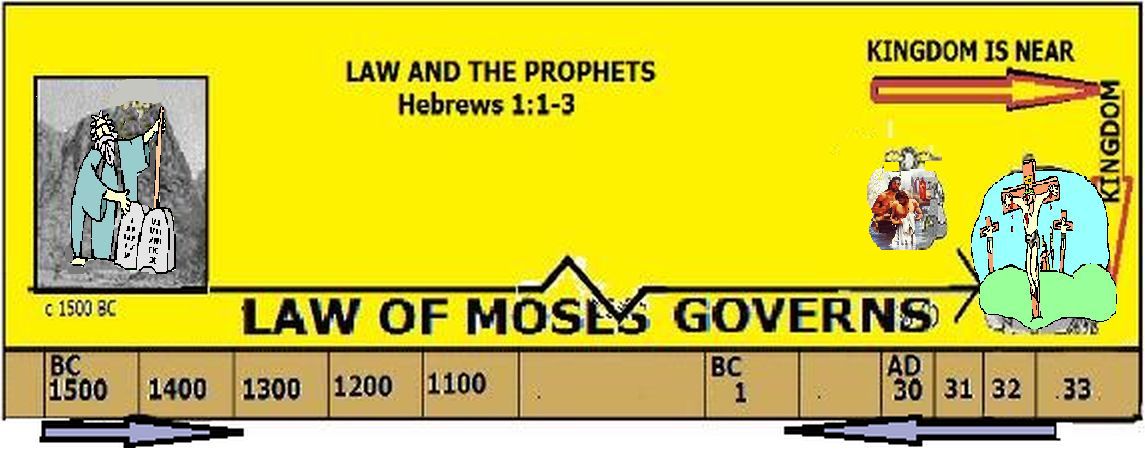DID JESUS DESTROY OR FULFIL?
|
What did Jesus mean by His statement in Matthew 5:17, “Think not that I am come to destroy the law, or the prophets: I am not come to destroy, but to fulfil”? Three things: 1. the Law and the Prophets referred to the OT; i.e., the Law of Moses. 2. Jesus was subject to this Law; He commanded people to repent of their sins to this Law. 3. Jesus came not to break or rebel against the Law but He came as the Law prophesied. Thayer’s Dictionary: fulfil=“to render full, i.e. to complete.” |
Consider, “Master, which is the great commandment in the law? Jesus said unto him, Thou shalt love the Lord thy God with all thy heart, and with all thy soul, and with all thy mind. This is the first and great commandment. And the second is like unto it, Thou shalt love thy neighbour as thyself” (Matthew 22:36-39). What Law was this answer referring to? Was it not the Law (of Moses) and Prophets (Deuteronomy 6:5, Leviticus 19:18)?i During Jesus’ earthly ministry, how many new commandments did He give?
When Jesus said, "A new commandment I give unto you," what was His subject? Which was it? (1) marriage and divorce? __ (2) love one another? ___ (3) baptism of repentance? ___ (4) letting one's light shine? ___.
If you are stumped, look at John 13:34. During the night in which Jesus was betrayed, He told His apostles, “A new commandment I give unto you, That ye love one another; as I have loved you, that ye also love one another. By this shall all men know that ye are my disciples, if ye have love one to another” (John 13:34).
The significance of this is that Jesus described it as His new commandment. In what way was “loving one another” new? It was different in its model. Someone has commented, “While the Law commanded human love, Jesus commands divine love for one another that is modeled on his own acts of love.”ii These words were said on the night that Jesus was betrayed. When would this new commandment have meaning and come into effect? Before or after His cross? If someone is tempted to answer, "before His crucifixion", there were only a few hours before His trials and His cross. A new testament is of force after men are dead (Hebrews 9:16).
Jesus had preached the commands of John, "Repent: for the kingdom of heaven is at hand" (Matthew 4:17; cf. 3:2). “Repentance” was not a new command; it had been commanded in the Law and Prophets (e.g., Ezekiel 18:30, etc.). The baptism that Jesus’ disciples practiced (John 4:1,2) had been authorized by the prophet John the Baptist, who was another “Elijah” (Luke 7:28; Malachi 4:5). It was not the baptism "in the name of Jesus", nor in the name of the Father and the Holy Spirit (Matthew 28:18-20; Acts 19:1-5) which would be commanded after the crucifixion. Such baptism would be in water and part of the new birth into the kingdom (John 3:3-5; Acts 2:38,41; 8:12; 10:47).
What does "at hand" mean? Does it mean that it is coming in near future? (YES)__ (NO)__. If so, it had not come while Jesus was preaching. If the kingdom was not in existence during the two or three years before the cross, what law was Jesus supporting and requiring the people to repent for disobeying it? Was it not the Mosaic Law? When would Jesus establish the kingdom? Who would still be alive when the kingdom came (Mark 9:1)? Was it not still in the future when the apostles asked him about it after the cross (Acts 1:6)? On the other hand, was it not in existence a few years later according to Colossians 1:13 and Revelation 1:9?
The laws of the Kingdom did not then come into effect until after Jesus' ascension. Since Jesus preached, "Repent" (of your sins), what sins were the Jews to repent of? "For sin is the transgression of the law" (1 John 3:4; compare Romans 4:15). What Law had the Jews violated? Was it not the Law of Moses?
Again, Jesus was tempted to break what laws? "[Jesus] was in all points tempted like as [we are, yet] without sin" ( Hebrews 4:15). Since sin is disobedience to a law, what law did Jesus obey (Galatians 4:4; Hebrews 5:8,9)? If you said "Moses' Law", then you and I understand the Bible alike.
When Jesus spoke to the multitudes of the things of His coming Kingdom, He spoke in parables. "All these things spake Jesus unto the multitude in parables; and without a parable spake he not unto them: That it might be fulfilled which was spoken by the prophet, saying, I will open my mouth in parables; I will utter things which have been kept secret from the foundation of the world" (Matthew 13:33-34).
COMPELLING CONCLUSION.
Could Jesus have been "sinless" if He taught the Jews to disobey Moses' Law (Deuteronomy 13:1-5)? Did not Moses teach to put such a one (even if a prophet) to death? Is one guiltless that leads others to disobey the current law? Obviously, any interpretation of Scripture that would have Jesus changing Moses' Law during His ministry would be in error, if not blasphemous.
If Jesus taught against or violated Moses' Law, the Jerusalem Sanhedrin Court could have so prosecuted Him for it and He could not have died for the sins of others. The effective charge against Jesus was blasphemy; i.e., that He admitted to being "the Christ, the Son of God" (Matthew 26:63). Of course, Jesus told the truth. To see a list of OT commands that Jesus obeyed/repeated during His earthly ministry while preparing the Jews for His Kingdom see Read more: - .
ihttp://www.gods-word-first.org/bible-study/613commandments.html: a list of OT commands. iiHahn in Ignatius Catholic Study Bible New Testament. |

|
